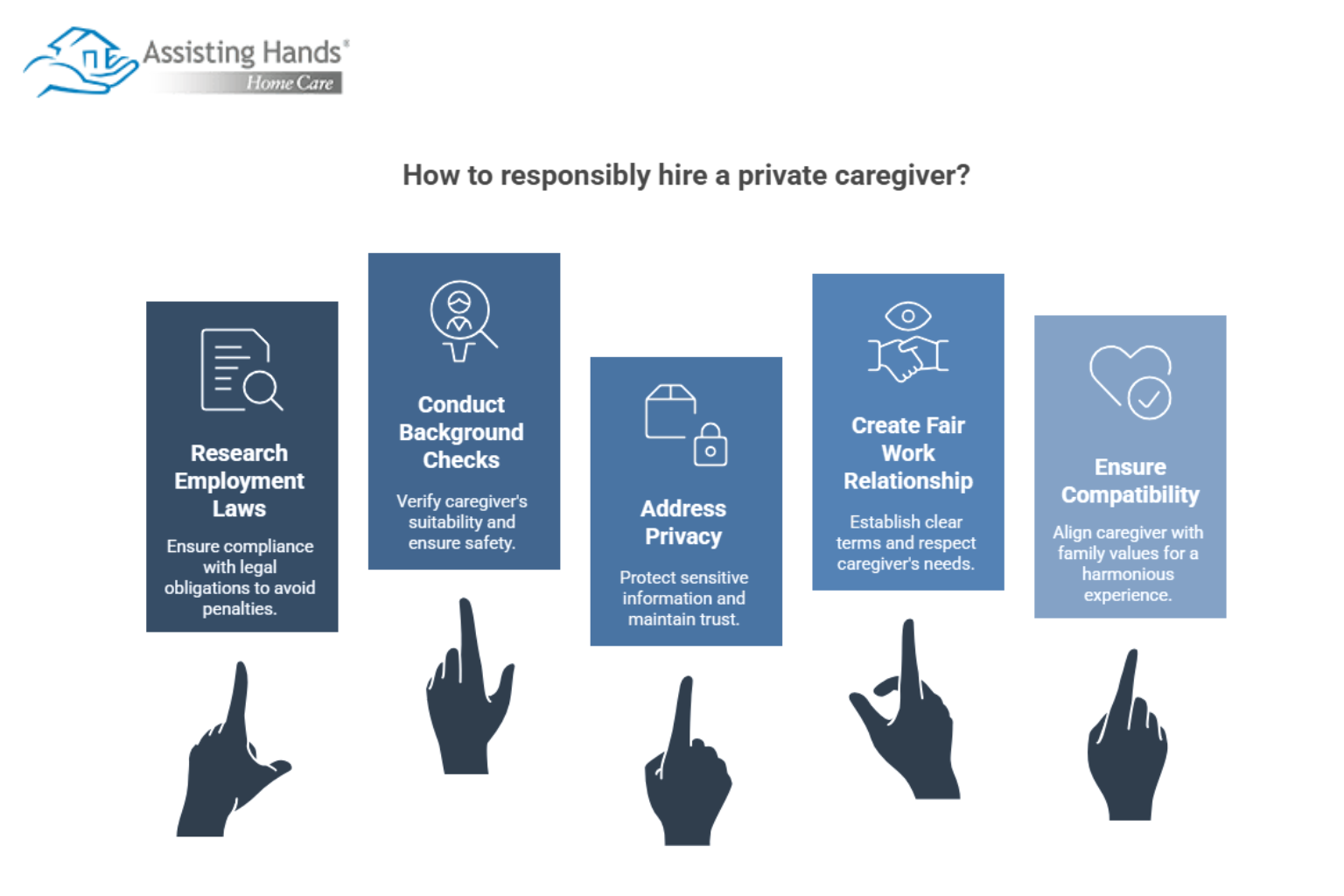
Table of Content
Hiring a private caregiver for a senior loved one is a significant decision that comes with both legal and ethical responsibilities. While ensuring the right level of care is crucial, navigating the legal landscape and maintaining ethical conduct are equally important. This guide outlines key considerations to help you hire responsibly.

Research Employment Laws and Regulations
When hiring a private caregiver, it’s essential to understand the legal obligations of employing someone in a household setting. Depending on where you live, these responsibilities may differ:
- Employment classification – Determine whether the caregiver is classified as an employee or an independent contractor. Misclassifying the caregiver could lead to legal consequences.
- Taxes and payroll – If the caregiver is considered an employee, you may be required to handle payroll taxes as well as Social Security and Medicare contributions. Understanding these obligations is critical to avoid penalties.
- Compliance with labor laws – Ensure you adhere to federal, state, and local labor laws, including minimum wage requirements, overtime pay, and workplace safety standards.
Research the applicable laws in your area or consult an attorney or labor expert to ensure compliance.
Making decisions for your loved one may include hiring a home caregiver to ensure your parent’s safety and comfort. Families looking for top-rated elder care providers can reach out to Assisting Hands Home Care. From respite care to specialized Alzheimer’s, dementia, stroke, and Parkinson’s care, there are many ways we can make life easier for seniors and their loved ones.
Conduct Thorough Background Checks
Ethical hiring begins with due diligence. Conducting comprehensive background checks on potential candidates isn’t only a legal safeguard but also a moral responsibility to your loved one. Key steps include:
- Criminal background check – Verify the caregiver has a clean criminal record, particularly for offenses that may raise concerns about trust and safety.
- Reference check – Speak with previous employers or families the caregiver has worked for to gain insight into his or her work ethic, behavior, and caregiving capabilities.
- Verification of credentials – If the caregiver claims specific certifications (e.g., CPR training or nursing assistance), ensure these qualifications are up to date and valid.
By conducting these checks, you reduce the risk of hiring someone unfit for the role and ensure your loved one’s safety and wellbeing.
Address Privacy and Confidentiality
Caregivers often have access to private and sensitive information about the seniors under their care and their families. Setting clear boundaries and guidelines around privacy is crucial.
- Confidentiality agreement – Consider drafting a confidentiality agreement that prevents the caregiver from sharing sensitive information with outside parties.
- Secure information handling – Ensure medical records, financial information, and personal details are stored securely and aren’t shared without proper consent.
- Limits on social media – Be clear about policies regarding sharing photos or details about your loved one on social media platforms.
Establishing these privacy protocols protects your loved one’s dignity and autonomy while maintaining trust between the family and the caregiver.
Create a Fair and Ethical Work Relationship
Providing care is demanding work, and fostering a fair and respectful work environment is an important ethical consideration. Here’s how to ensure a positive relationship:
- Agree on clear terms – Create a written contract that outlines pay, hours, responsibilities, and expectations. This clarity benefits both you and the caregiver.
- Provide training opportunities – Offer access to additional training to help the caregiver excel in the role and better understand your loved one’s needs.
- Respect work-life balance – Avoid exploitative behavior by respecting agreed-upon work hours and giving the caregiver adequate time off.
- Conflict resolution – Create an open channel for communication so concerns or misunderstandings can be addressed respectfully and promptly.
Treating caregivers fairly not only builds a stronger bond but also results in higher-quality care for your loved one.
If you have a senior loved one who needs help maintaining a high quality of life while aging in place, reach out to Assisting Hands Home Care, a leading provider of home care Miami Beach families can trust. Our caregivers help seniors focus on healthy lifestyle habits such as eating nutritious foods, exercising regularly, and maintaining strong social ties, and we offer mentally stimulating activities that can boost cognitive health and delay the onset of dementia.
Ensure Cultural and Emotional Compatibility
While skills and qualifications are essential, cultural and emotional compatibility shouldn’t be overlooked when hiring a caregiver. A good caregiver should align with your family’s values and lifestyle.
- Language and communication – Ensure the caregiver speaks your loved one’s preferred language and communicates effectively.
- Cultural sensitivity – Respect cultural or religious preferences, especially if they play a significant role in your loved one’s daily life.
- Empathy and patience – Look for personal qualities such as compassion, patience, and a willingness to build a meaningful connection with your loved one.
Taking compatibility into account creates a harmonious caregiving experience, ensuring your loved one’s comfort and happiness.
Having legal and ethical protections in place is vital for your loved one and your family, and so is making sure your parent gets the high-quality care he or she deserves. Every senior has different needs when aging in place. Some simply need occasional assistance with household chores, while others may be managing serious illnesses and require more extensive live-in care. Miami seniors can count on Assisting Hands Home Care to provide the in-home care they need and deserve. To learn more about our reliable, compassionate in-home care services, contact us today.
